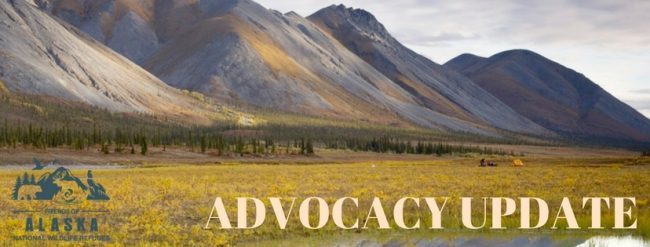by Board President, David Raskin

Oil Drilling in the Arctic Coastal Plain
There has been considerable criticism of the DOI fast-track goal of completing a draft environmental statement (DEIS) in less than six months. We participated in a meeting of conservation organizations with the BLM staff that is implementing orders from DOI. The scoping process has been completed and comments can be viewed online.
It appears that the independent contractor hired to prepare the Draft Environmental Statement (DEIS) will rely mostly on existing data and previous analyses, most of which are either incomplete or out of date. BLM was not forthcoming in response to our questions about the process and timing of actions. The Yukon government is launching its own study of drilling impacts in Alaska’s Arctic refuge. The Canadian territory is particularly concerned with potential impacts to the caribou herds who calve on the Arctic National Wildlife Refuge’s coastal plain and the Gwich’in people who depend on them for subsistence.
In the meantime, BLM has accepted a permit to conduct extensive seismic exploration on the Coastal Plain. The BLM is working on an Environmental Assessment (EA) of the proposed activities, but they provided little information about the timing of its completion, if and when a public comment period will occur, and when a decision will be made on the need for a full environmental analysis. The potential damage from such activities is great, and lasting damage from previous seismic activities is described in this article:
This rushed and potentially flawed process to assess the potential damage from seismic exploration and oil development has raised widespread concerns that legal action by conservation organizations would cause considerable delays in government plans to develop oil in the Arctic Refuge.
Izembek Land Trade and Road
Under orders from DOI, the Fish and Wildlife Service granted a permit for survey work to delineate the boundaries of the lands in the Refuge that would be conveyed to build the road through the Izembek Wilderness. This legally-questionable survey that was hurriedly completed in July impacted wildlife and habitat with 80 helicopter landings and installation of 122 survey monuments. This intensive work with motorized equipment and aircraft was conducted within congressionally-designated wilderness in preparation for trading away vital public lands to a private entity to build the controversial road through the heart of the Izembek Wilderness.
The lawsuit challenging the proposed land trade and road through the heart of the Izembek wilderness is working its way through the Anchorage Federal District Court as Trustees for Alaska continues its excellent legal work on behalf of Friends and eight other conservation organizations who filed the lawsuit against the proposed land trade and road. Our legal brief was filed, and the Department of Justice reply brief is due on August 22. We remain optimistic that we will prevail against this destructive, costly, and unnecessary project.
Sturgeon v. Frost
The U.S. Supreme Court agreed to rehear the Sturgeon lawsuit against the National Park Service that had prevented his continued operation of a hovercraft in a national park. This suit challenged the authority of the Park Service to regulate activities on navigable waters in the national parks, which has major implications for national wildlife refuges and other national conservation lands. We had previously joined an Amicus Brief submitted by Trustees for Alaska on behalf of 14 conservation organizations in support of the Park Service. We reaffirmed our participation in this new round in the Supreme Court.
